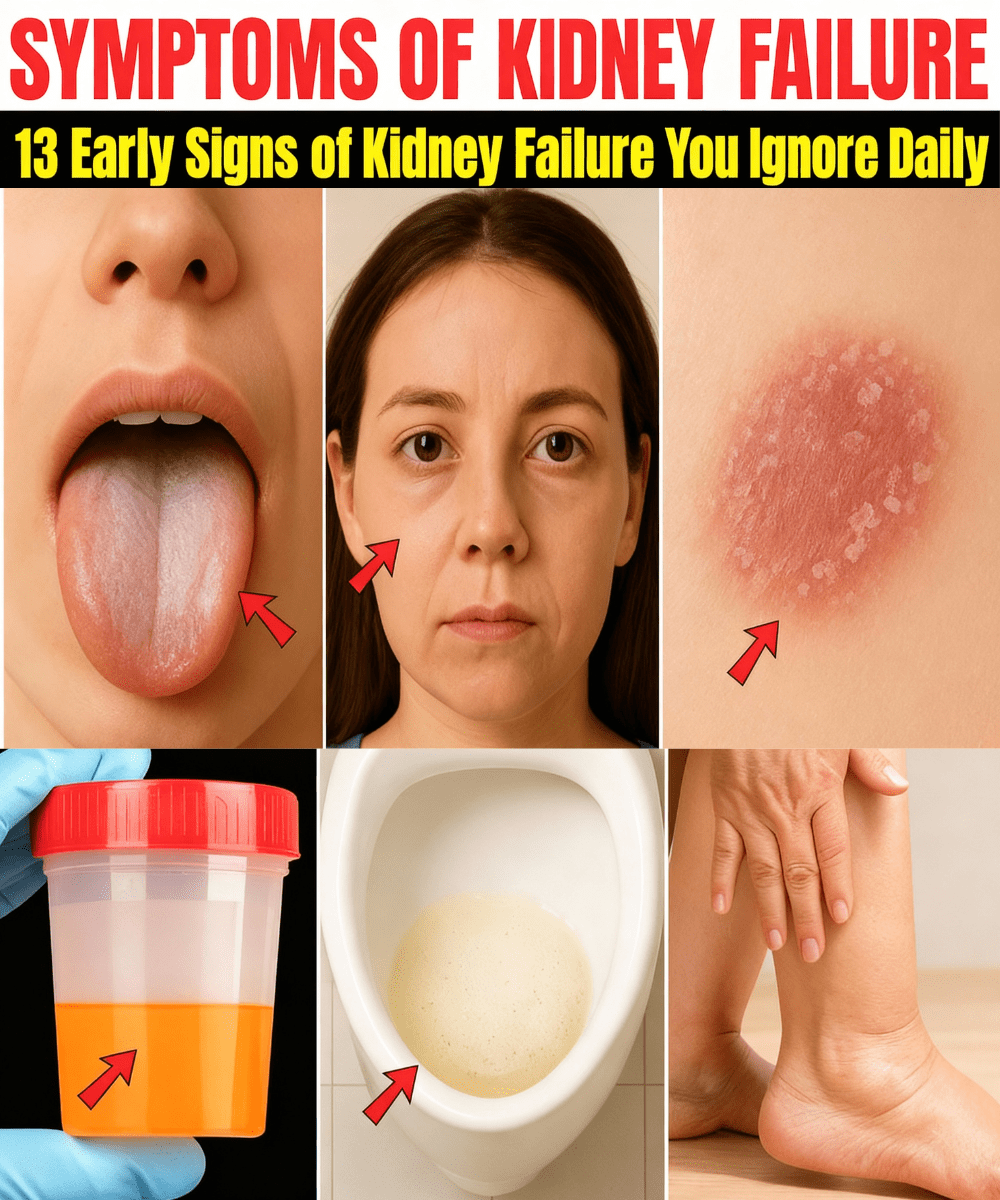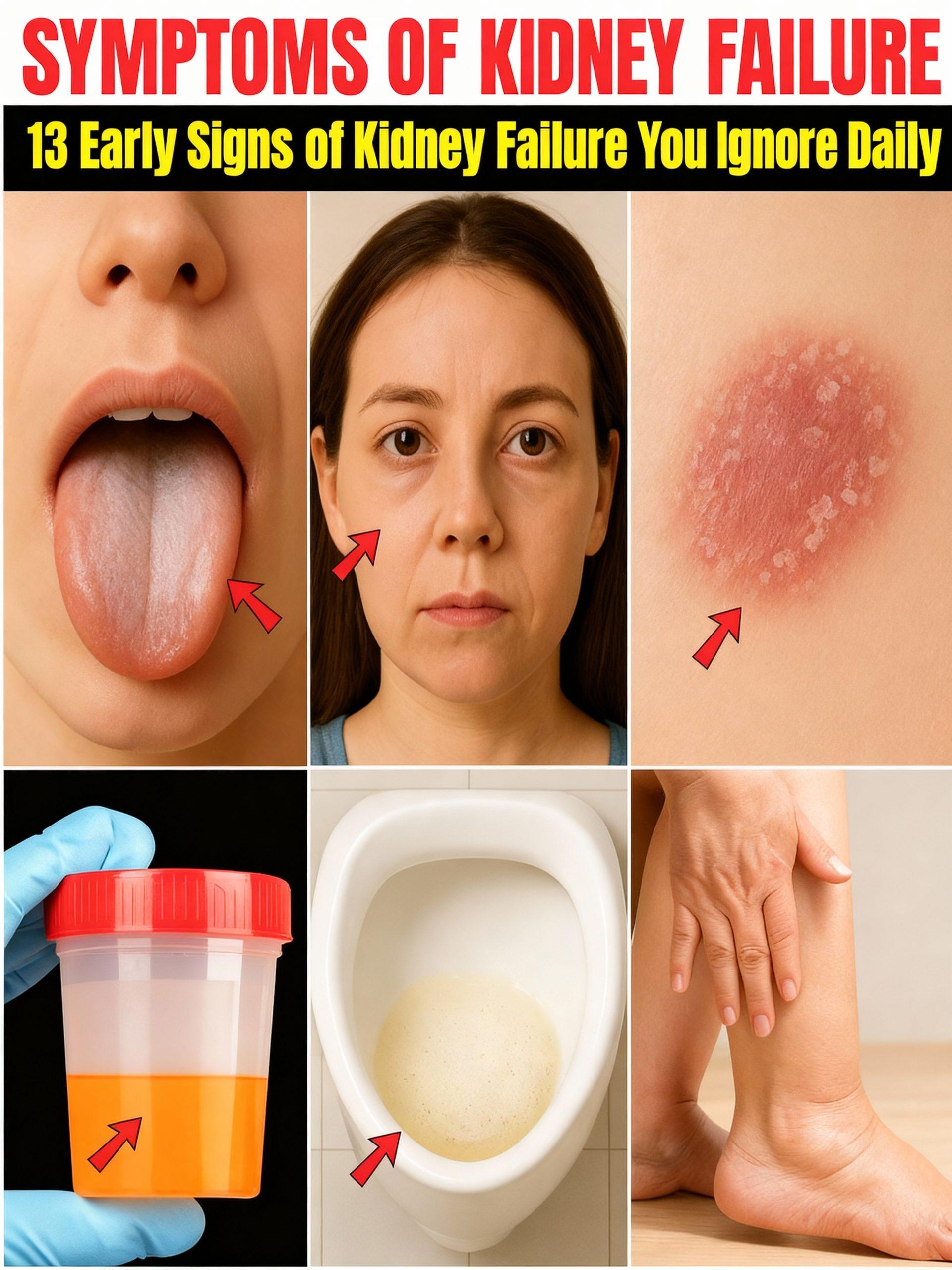💔 The Invisible Crisis: Is Your Body’s Filtration System About to Fail?
Your kidneys are the unsung heroes of your body—a pair of hardworking organs responsible for a constant, life-sustaining balancing act. Every minute, they filter your blood, regulate electrolytes, balance fluid levels, and produce vital hormones. When they falter, the entire system is destabilized, leading to a condition known as Chronic Kidney Disease (CKD), which often progresses silently to Kidney Failure.

The danger lies in the stealth of this disease. The early warning signs are so subtle, so easily mistaken for normal aging, stress, or a lack of sleep, that they are ignored until the damage is irreversible. These overlooked symptoms are your body’s desperate plea for help.
It’s time to move beyond guessing. Understanding these 13 early red flags is your first and most critical defense. Ignoring these subtle symptoms increases your risk of heart disease, stroke, and life-threatening complications. Read on to recognize the signals and discover what immediate action you must take to protect your most vital filtration system.
🩸 The Systemic Breakdown: Why Early Signs Emerge in Odd Places
When kidneys fail to filter effectively, the body becomes a reservoir for toxins (urea and creatinine), excess fluid, and metabolic waste. This accumulation disrupts every major system, causing symptoms to appear in the feet, skin, brain, and heart—places you would never immediately associate with kidney trouble.
🚩 13 Early Warning Signs of Kidney Dysfunction
1. 🚶 Persistent Fatigue and Unexplained Weakness
- The Reason: A buildup of toxins and waste products in the blood (uremia) acts like a constant poison, drastically draining your energy reserves. Additionally, failing kidneys often produce less erythropoietin (EPO), a hormone that signals the body to make red blood cells, leading to anemia (lack of oxygen).
- The Symptom: Feeling perpetually sluggish, mentally drained, and exhausted—even after a full night’s sleep. If simple daily tasks feel unusually heavy, do not dismiss it as aging.
2. 🦶 Swelling in Legs, Ankles, and Feet (Edema)
- The Reason: Healthy kidneys remove excess fluid. Failing kidneys cannot keep up, causing fluid to leak out of the blood vessels and accumulate in the tissues, especially where gravity pulls it.
- The Symptom: Noticing puffy ankles, tight shoes by the end of the day, or seeing a temporary indentation when you press your finger into your shin (pitting edema).
3. 🌙 Frequent Nighttime Urination (Nocturia)
- The Reason: This is often one of the very first signs. Damaged kidneys lose their ability to concentrate urine, causing frequent, high-volume urination throughout the night.
- The Symptom: Waking up two or more times to urinate. This fragmented sleep further exacerbates the fatigue experienced during the day.
4. 🫧 Foamy or Bubbly Urine
- The Reason: Persistent foamy urine (bubbles that don’t dissipate quickly) can indicate proteinuria—the kidney’s filters (glomeruli) are damaged, allowing large protein molecules (like albumin) to leak into the urine.
- The Symptom: This is a clear visual signal that the filtration barrier is compromised and requires immediate testing.
5. 👁️ Puffy Eyes in the Morning
- The Reason: Similar to leg swelling, the protein leaking into the urine lowers the protein content in the blood. This reduction causes fluid to migrate out of the vessels and collect in the soft tissues around the eyes.
- The Symptom: Waking up regularly with swollen or puffy eyes. This subtle sign can appear long before general body edema.
6. 🌡️ Uncontrolled High Blood Pressure (Hypertension)
- The Reason: Kidneys play a direct role in blood pressure control through salt/water balance and the production of the hormone renin. When kidney tissue is damaged, this regulation fails, leading to chronic, dangerous hypertension.
- The Symptom: High blood pressure that is difficult to manage with medication. This creates a dangerous loop, as high blood pressure is also a leading cause of kidney damage.
7. 🧠 Poor Concentration and Brain Fog
- The Reason: As toxic waste products accumulate in the bloodstream (uremia), they cross the blood-brain barrier, directly affecting neurological function.
- The Symptom: Experiencing difficulty concentrating, memory lapses, confusion, or severe “brain fog”. These symptoms are often misattributed solely to stress or aging.
8. 👃 Metallic Taste in Mouth and Bad Breath
- The Reason: Uremic toxins affect the taste buds, and the body attempts to excrete urea through the breath, converting it into ammonia.
- The Symptom: Complaining of a persistent metallic taste in the mouth (dysgeusia) or breath that smells faintly of ammonia (ammonia breath).

9. 🤢 Nausea, Vomiting, and Loss of Appetite
- The Reason: The constant presence of toxins in the bloodstream makes the body feel perpetually sick, triggering the digestive system to revolt.
- The Symptom: Frequent, unexplained episodes of nausea, vomiting, and a general loss of appetite that can lead to unintentional weight loss.
10. 🦵 Muscle Cramps and Restless Legs
- The Reason: Declining kidney function disrupts the balance of key electrolytes, particularly calcium and phosphorus. Low calcium levels often cause muscle excitability.
- The Symptom: Experiencing frequent, unexplained muscle cramps, twitches, or the disruptive, uncomfortable sensation of restless legs syndrome at night.
11. ✋ Persistent Itchy and Dry Skin
- The Reason: Healthy kidneys help regulate minerals. When they fail, mineral imbalances and the accumulation of waste products can cause extreme dryness and intense, persistent itching (pruritus).
- The Symptom: Skin that is chronically dry, itchy, or develops unusual rashes, often despite topical moisturizers. This is often ignored as a simple skin condition.
12. 🤕 Chronic Back or Side Pain
- The Reason: While back pain is common, persistent, dull aches in the lower back or side of the abdomen (where the kidneys are located) may indicate an underlying kidney infection, stone, or tissue inflammation.
- The Symptom: Chronic or recurring pain specifically in the flank area.
13. 📉 Unexplained Weight Loss and Malnutrition
- The Reason: Driven by the combination of chronic nausea, loss of appetite (due to toxins), and the metabolic burden of the disease.
- The Symptom: Losing weight without actively trying to. This is a critical indicator of severe, systemic illness.
🛑 Call to Action: Protect Your Silent Killers
Kidney failure is often called a “silent killer” because these early symptoms are so insidious and easy to overlook. The key to mitigating damage is swift, proactive action.
If you recognize two or more of these early warning signs, it is imperative to:
- Consult a Healthcare Provider: Do not delay. Request a comprehensive check-up with a focus on renal health.
- Request Specific Tests: Ask for a Blood Urea Nitrogen (BUN) test, a Serum Creatinine test, and a Urine Albumin-to-Creatinine Ratio (UACR) test. These simple tests are the foundation for diagnosing CKD.
- Lifestyle Overhaul: Take immediate steps to manage blood pressure and blood sugar (the two leading causes of kidney damage), reduce salt intake, and maintain hydration.
Takeaway: Your kidneys are irreplaceable. Ignoring their whispers of distress can lead to irreversible damage. Be vigilant, recognize the signs, and prioritize your health today.






